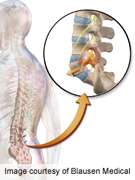(HealthDay)—Patients meeting strict criteria benefit more from surgery for degenerative spondylolisthesis (DS), compared to non-operative care, although the treatment effect of surgery is modified by specific patient characteristics, according to a study published in the Oct. 1 issue of Spine.
Adam M. Pearson, M.D., from the Geisel School of Medicine at Dartmouth in Hanover, N.H., and colleagues analyzed data from patients with DS treated with surgery (395 patients) or non-operative care (295 patients). The authors used 55 baseline variables to define subgroups for calculating the time-weighted average treatment effect (TE) for the Oswestry Disability Index during four years (TE = change in Oswestry Disability Index[surgery] − change in Oswestry Disability Index[non-operative]).
The researchers found that all analyzed subgroups that included at least 50 patients improved significantly more with surgery than with non-operative treatment (P < 0.05). There were independent associations with greater TE demonstrated for: age 67 years or less (P = 0.014); female sex (P = 0.01); the absence of stomach problems (P = 0.035); neurogenic claudication (P = 0.004); reflex asymmetry (P = 0.016); opioid use (P < 0.001); not taking antidepressants (P = 0.014); dissatisfaction with symptoms (compared to those satisfied or neutral, P = 0.039); and anticipating a high likelihood of improvement with surgery (compared to anticipating a low likelihood of improvement with surgery, P = 0.019).
"Patients who met strict inclusion criteria improved more with surgery than with non-operative treatment, regardless of other specific characteristics," the authors write.
More information:
Abstract
Full Text (subscription or payment may be required)
Journal information: Spine
Copyright © 2013 HealthDay. All rights reserved.























